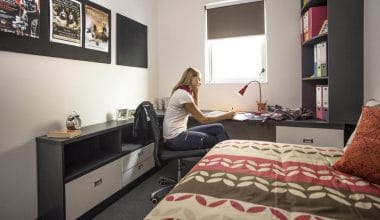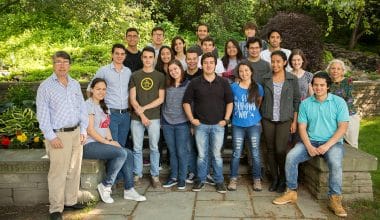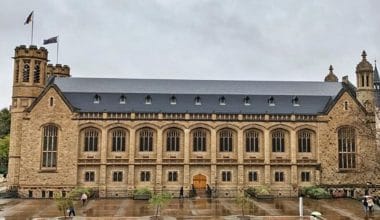If you aspire to become a North Carolina lawyer or practice law in the US, you must be a member of a State Bar Association in the US or your home country or, just start from any law school in North Carolina.
This implies that you need the best training you can get. You may want to consider applying for any of the law schools in North Carolina.
But you don’t just become a member of a Bar Association. Becoming a member of the Bar Association in the United States means getting the right education, experience, and passing some exams.
This is exactly what this writer intends to achieve with you; empower you with all you need to know about Law schools in North Carolina, plus what it takes to become a full lawyer in the state of North Carolina.
The table of contents below gives you an overview of all wrapped in this article.
Table of contents
How Long is the Law School Program in North Carolina?
Law school programs in North Carolina, as well as in other US states. They generally lead to a Juris Doctor (JD) that takes approximately three years to complete.
Unlike a student’s college degree, law school does not allow a student to choose their own pace.
Most law schools require law students to complete the law program in three years. Many of these schools also offer Masters in Law and Doctorate in Legal Studies programs for students with a JD.
Some schools offer dual degree programs, where students earn a law degree and another degree, such as a Master of Science, at the same time.
Programs may be available in part-time, full-time, and even partially-online formats. Students gain practical experience through fieldwork and can attend clinics specializing in law.
Read: 15 Free Online Law Courses With Certificates
How Much Does Law School Cost in North Carolina?
According to the annual US News and World Report survey of more than 197 law programs, the average cost of attending a private law school in North Carolina is $43,020 and attending a public law school costs an average of $26,264 for state residents and $39,612 to leave state students in North Carolina.
How Much Does the Bar Exam Cost?
In general, you can expect to pay between $100 and $1300 to register for the bar exam, depending on your status! These fees are paid directly to your state’s Board of Law Examiners (or equivalent).
How Much Do Lawyers Earn in North Carolina?
According to the Bureau of Labor Statistics, attorneys in North Carolina earn an average of $ 129,990 per year, equivalent to $ 62.50 per hour.
This is 10% less than lawyers across the country but 175% more than the typical North Carolina worker.
Law Schools in North Carolina
North Carolina houses seven universities with law schools that grant the Juris Doctor degree. These schools are detailed below.
#1. Duke University Law School
Tuition Fee: $58,000 per year
Duke University is located in Durham, North Carolina, and enrolls more than 15,000 students each year.
Accredited by the American Bar Association, Duke University Law School offers a comprehensive education through a combination of traditional courses, practical skills development, seminars, and clinics.
The Juris Doctor program at Duke University requires courses in ethics, legal writing, and professional development.
The basic curriculum is known for its strengths by providing a solid foundation in areas of concentration, including corporate and business law, constitutional and public law, criminal law, and environmental law.
Duke Law School is an ambitious, innovative, and forward-looking institution whose mission is to prepare students for responsible and productive life in the legal profession.
As a community of academics, the Law School also provides national and international leadership in efforts to improve law and legal institutions through education, research, and other forms of public service.
Duke Law School also awards Master of Laws and Doctor of Juridical Science degrees.
Duke University offers 4 Bachelor of Law programs. It is a large private university in a medium-sized city. In 2015, 210 students graduated in the Law study area with students who obtained 210 Doctorates.
Student to Teacher Ratio: 5:1
Acceptance Rate: 24%
Location: Duke University Law School, Science Drive, and Tower view Road, Durham 27708, telephone: (919) 613-7006
#2. The University of North Carolina
The University of North Carolina at Chapel Hill is the oldest public institution in the country, and clearly one of its most successful.
From the colonial period to the present, graduates of the University’s School of Law have played powerfully disproportionate roles in the direction of the state, the south, and the nation.
With a student body of over 28,000, the University of North Carolina at Chapel Hill is the oldest public university in the country.
The University’s Law School has had the approval of the American Bar Association since 1928.
The school’s 3-year Juris Doctor program begins with a study of legal methods and analysis, legal research and writing, oral arguments, and basic subjects such as the American legal tradition.
The second-year students will study topics such as business associations, evidence, income tax, guaranteed transactions, and trusts and properties.
Third-year students will complete studies based on skills such as external internships, a clinical program or the trial defense program. UNC at Chapel Hill also offers a master’s degree in law and several dual degree programs.
The University of North Carolina at Chapel Hill offers a 1 Law degree program. It is a large public university in a small city.
In 2015, 231 students graduated in the area of law study with students who obtained 231 doctorates.
Student to Teacher Ratio: 17:1
Acceptance Rate: 45%
Location: Chapel Hill – University of North Carolina Law School, 100 Ridge Road, CB # 3380, Chapel Hill 27599-3380, telephone: (919) 962-5106
See Also: Easiest Law Schools to Get| Expert Guide
#3. Elon University
Tuition Fee: $39,000 per year
Elon University is a private university located in the suburb of Elon. The school serves almost 6,000 students a year. Elon’s law program can be completed in three years.
Students will begin their first year with legal research and writing courses, legal method and communication, and criminal law.
In the second and third years, students will study evidence, constitutional law, and professional responsibility, as well as elective courses.
The Elon University School of Law is based on the University’s national reputation for excellence in committed learning and leadership education.
Elon Law students are challenged to reach the highest levels, preparing to become lawyers who fully adapt their roles as problem solvers and society leaders.
Students can also participate in Elon University law clinics, including an elder law clinic, an immigration law clinic, and a will writing clinic.
Elon University offers a 1 Law Degree program. It is a private medium-sized university in a medium-sized suburb. In 2015, 76 students graduated in the area of law study with students who obtained 76 doctorates.
Student to Teacher Ratio: 14:1
Acceptance Rate: 48%
Location: Greensboro – Elon University Law School, 201 North Greene Street, Greensboro 27401, telephone: (336) 279-9200
#4. North Carolina Central University
Tuition Fee: $11,000 per year (Non-residents: $31,000)
North Carolina Central University is a public university in Durham with a student population of over 8,000. The university offers the Juris Doctor degree program through its law faculty.
The mission of the North Carolina Central University Law School is to provide a challenging and broad-based educational program designed to stimulate the highest level of intellectual research and foster in each student a deep sense of professional responsibility and personal integrity to produce competent and socially responsible members of the legal profession.
Students attending the North Carolina Central University Law School can choose between a full-time program and a part-time night program.
Graduates of the NCCU Law program will be prepared for careers such as lawyers, judges, community organizers, and Foreign Service officials.
The law school of the university is accredited by the North Carolina State Bar Council and the American Bar Association.
North Carolina Central University offers a 1 Law Degree program. It is a medium-sized public university in a medium-sized city.
In 2015, 177 students graduated in the area of law study with students who obtained 177 Doctorates.
Student – Teacher Ratio: 19:1
Acceptance Rate: 48%
Location: North Carolina Central University Law School (NCCU), 1512 S. Alston Avenue, Durham 27707, telephone: (919) 530-6333
#5. Wake Forest University
Tuition Fee: $44,000 per year
Wake Forest University is a private university located in Winston-Salem. The school serves more than 7,000 students annually.
The J.D. The school requires students to complete 90 credit hours and can be completed in three years.
Students will study basic legal concepts such as civil procedures, contracts, and legal research and writing. In the second and third years, students will pass courses of evidence, legislation and administrative law, and professional responsibility.
The school offers several dual degrees, such as J.D. and Master of Arts in Religion and J.D. and Master of Business Administration.
The school also awards degrees of Master of Laws, Master of Studies in Law, and Doctor of Juridical Science.
Wake Forest University offers a 1 Law Degree program. It is a private medium-sized university in a medium-sized city.
In 2015, 137 students graduated in the Law study area with students who obtained 137 Doctorates.
Student- Teacher Ratio: 5:1
Acceptance Rate: 56%
Location: Winston-Salem – Wake Forest University Law School, 1834 Wake Forest Road, Winston-Salem 27106, telephone: (336) 758-5430
#6. Charlotte – Charlotte Law School
Tuition Fee: $42,000 per year
Charlotte Law has an educational model designed to meet the needs of a 21st-century lawyer. This includes a focus on students.
Its objective is to provide an intense commitment to faculty and staff, a personalized experience, and a rigorous but innovative study program that will maximize your chances of success in law school, passing the bar exam, and career opportunities.
Charlotte School of Law offers 1 Law Degree program. It is a private university in a big city. In 2015, 440 students graduated in the Law study area with students who obtained 440 Doctorates.
Student to Teacher Ratio: 17: 1
Acceptance Rate: 66%
Location: 1211 East Morehead Street, Charlotte 28204, telephone: (704) 971-8500
Read Also: Dickson Poon Undergraduate Law Scholarships, London
#7. Campbell University Law School
Tuition Fee: $40,000 per year
Campbell University is a Baptist university located in Buies Creek. The school enrolls more than 6,000 students a year.
Students interested in studying law can enroll in the Doctoral program in Jurisprudence of the University of Campbell offered through the Norman Adrian Wiggins Law School of the university.
The program is designed to be completed in three years and requires students to complete 90 credits.
Applicants from Campbell University must already have a bachelor’s degree and must take the LSAT before February of the year they plan to attend law school.
The Faculty of Law is a very demanding community of professors and students, intentionally small and intensely personal whose goal, guided by transcendent values, is to develop lawyers.
Lawyers who possess moral conviction, social compassion, and professional competence and see law practice as A Call to serve others and create a more just society.
Freshmen take courses in legal basic concepts such as civil procedures, grievances, constitutional law, and contracts.
Campbell University offers 1 Law Degree program. It is a medium-sized private university in a peripheral city. In 2015, 148 students graduated from the Law study area with students who obtained 148 Doctorates.
Student to teacher ratio: 20: 1
Acceptance Rate: 62%
Location: Raleigh – Norman Adrian Wiggins Law School of Campbell University, 225 Hillsborough Street, Suite 401, Raleigh 27603, telephone: (909) 865-4650
Career Requirements to Practice Law in North Carolina?
To practice law in the state of North Carolina, people must take and pass the state bar exam. To be eligible to take the bar exam, applicants must graduate from an approved law school with a Juris Doctor degree.
Can I Get a Law Degree Online in North Carolina?
Bachelor’s and master’s degrees online in legal studies, generally designed to provide an overview of the law for those working in other professional fields, as well as Master’s degrees in Law or LL.M., exist online.
An LL.M. It may be a good option for foreign lawyers who want to know the US legal system.
You may not be able to obtain a JD accredited by the American Bar Association completely online, but there are many ways to accelerate a legal career through online courses and programs.
Websites such as edX, Coursera, Alison.com, and Udemy offer free courses that cover various legal fields, such as tax and labor legislation, or specific legal issues, such as bioethics and freedom of expression.
Students can enroll in these online classes to assess or satisfy their interest in different law specialties or develop a basic understanding of a topic for their current job.
Those who prepare for the LSAT can also do it online. The 7Sage website, for example, offers a program that costs $ 179 for three months of access that includes more than 50 hours of lesson videos, printable practice tests, and analysis to help law students determine where to focus their efforts.
Other options with variable costs are available in Princeton Review, Kaplan Test Prep, Velocity Test Prep and Magoosh Online.
A certificate, whether for credit or not, can provide opportunities to learn about a specific field of law, but will not allow a student to become a practicing lawyer. Other online certificates are aimed at those who want a specific job as a legal secretary or legal assistant.
Currently, the American Bar Association does not accredit any J.D. But there are some options to win a J.D. in the mixed format, or partially online.
Students visit the campus 10 times throughout the program to attend skills-based classes and meet teachers and classmates.
Frequently Asked Questions
Seven law schools
1. Duke University Law School
2. The University of North Carolina
3. Elon University
4. North Carolina Central University
5. Wake Forest University
6. Charlotte – Charlotte Law School
7. Campbell University Law School
North Carolina Central University School of Law
With a minimum LSAT score of 140 and a 2.90 GPA, your chances of getting into this school are excellent. The tuition fees are also attractive if you are a resident of the state, about $19,000, but if you are a non-resident, a full-time J.D. program costs about $41,000.
Conclusion
Studying law is not an easy journey but it is worth it in the end. The quality of knowledge you get as a lawyer will majorly depend on the school you are trained in. Quality is not a subject to be compromised.
Hence, you need to consider pursuing your law degree in any of the law schools in North Carolina. So check it out and start applying.
References
Recommendation
DISCLOSURE: This post may contain affiliate links, meaning when you click the links and make a purchase, we receive a commission.






Comments are closed.